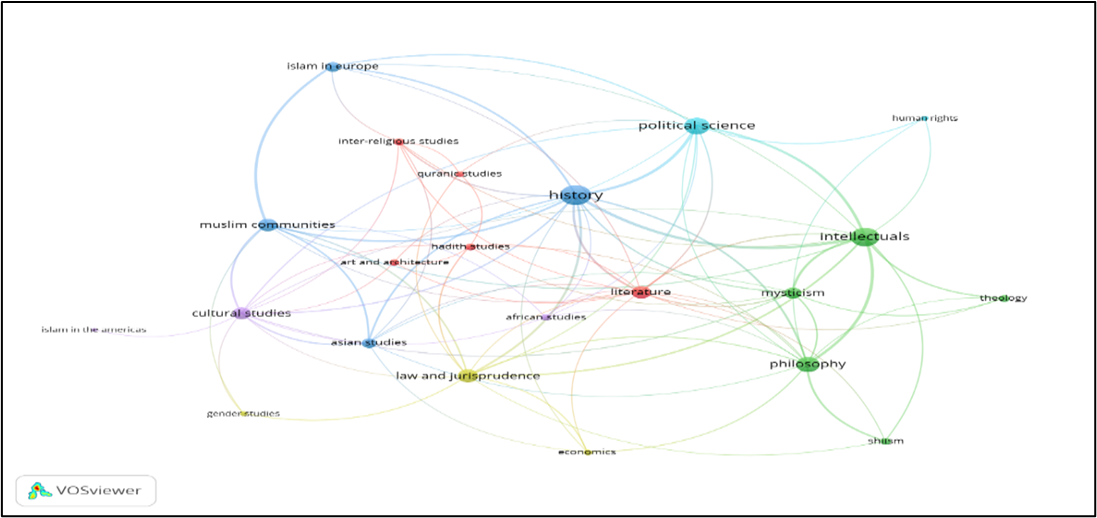Scientific Discourse amongst the Scholars of the Oxford Journal of Islamic Studies: Bibliometric Study, and Geopolitical Analysis and Insights
Abstract
 Abstract Views: 0
Abstract Views: 0
This paper examines the state of scholarly communication within the field of Islamic Studies as reflected by the Oxford Journal of Islamic Studies (OJIS). The field of Islamic studies has witnessed significant growth in recent years, with a surge in publications covering a wide range of subfields. The paper highlights challenges in scholarly communication, particularly in introducing a peer-review culture and fostering voluntary peer-review in Islamic studies. The study also explores the impact of the emphasis on research and publications in universities in the Arab Gulf countries, potentially shifting the focus from teaching to research. This study offers a comprehensive analysis of OJIS publications, encompassing articles, books, and book reviews from 1990 to 2021. Through bibliometric analysis, it assesses the academic prominence of Islamic Studies, investigates publication patterns, scrutinizes book selection criteria, compares articles, books, and reviews, contextualizes publications within their geopolitical milieu, and offers recommendations for future research. The study reveals shifts in publication patterns influenced by global events, while also highlighting highly cited articles and influential authors. Furthermore, it provides insights into the thematic evolution of research trends, demonstrating the multi-disciplinarity of OJIS publications. The paper concludes with a geographical analysis, showcasing the countries with the most significant contributions to OJIS publications. Overall, this research contributes to the understanding of Islamic Studies scholarship and its global impact.
Downloads
References
Alshater, Muneer M., M. Kabir Hassan, Ashraf Khan, and Irum Saba. “Influential and Intellectual Structure of Islamic Finance: A Bibliometric Review.” International Journal of Islamic and Middle Eastern Finance and Management 14, no. 2 (2021): 339–65, https://doi.org/10.1108/IMEFM-08-2020-0419
Anjali Singh, Weng Marc. Lim, Sumi Jha, Satish Kumar, and Maria. Vincenza Ciasullo. “The State of the Art of Strategic Leadership.” Journal of Business Research 158 (C) (2023), https://doi.org/10.1016/j.jbusres.2023.113676
Cesari, Jocelyn. “Islam in the West: From Immigration to Global Islam.” Harvard Middle Eastern and Islamic Review 8 (2009): 148–75.
Furman, Nelly., David Goldberg, and Natalia Lusin. “Enrollments in Languages Other than English in United States Institutions of Higher Education, Fall 2006.” ADFL Bulletin 39, nos. 2 & 3 (2008): 66–88, http://dx.doi.org/10.1632/adfl.39.2.66
Guenther, Sebastian. “Assessing the Sources of Classical Arabic Compilations: The Issue of Categories and Methodologies.” British Journal of Middle Eastern Studies 32, no. 1 (2005): 75–98.
Handoko, Luqman Hakim. “Bibliometric Analysis and Visualization of Islamic Economics and Finance Articles Indexed in Scopus by Indonesian Authors.” Science Editing 7, no. 2 (2020): 169–76.
Harande, Y. H. “Knowledge Diffusion through Islamic Architecture: A Bibliometric Analysis.” Middlebelt Journal of Library and Information Science 14 (2015): 120–28.
Hussain, Abid., Muhammad Ibrahim, and Sara Saeed. “A Bibliometric Analysis of Contributions in Islamic Studies (Journal): 2009–2011.” Pakistan Library Association Journal 22 (2014): 24–33.
Hussain, Mohammad., and Ms. Saddiqa. “Trends of Publications in Peshawar Islamicus Research Journal: A Bibliometric Study from 2010–2020.” Library Philosophy and Practice (e-journal), no. 4373 (2020). Accessed October 12, 2024. https://digitalcommons.unl.edu/libphilprac/4373.
Kurzman, Charles., and Carl Ernst. “Islamic Studies in U.S. Universities.” Review of Middle East Studies 46, no. 1 (2012): 24–46.
Sarwar, Raheem., and Saeed ul Hassan. “A Bibliometric Assessment of Scientific Productivity and International Collaboration of the Islamic World in Science and Technology (S&T) Areas.” Scientometrics 105 (2015): 1059–77, https://doi.org/10.1007/s11192-015-1718-z
Stearns, Peter N. “Why Study History?” American Historical Association, 1998. Accessed October 12, 2024. http://www.historians.org/about-aha-and-membership/aha-history-and-archives/archives/why-study-history (1998).

Copyright (c) 2025 Syed Nazim Ali, Saqib H. Khateeb, Muslehuddin Musab Mohammed

This work is licensed under a Creative Commons Attribution 4.0 International License.

This work is licensed under a Creative Commons Attribution 4.0 International License. Authors retain copyright and grant the journal right of first publication with the work simultaneously licensed under a Creative Commons Attribution (CC-BY) 4.0 License that allows others to share the work with an acknowledgement of the work’s authorship and initial publication in this journal.







